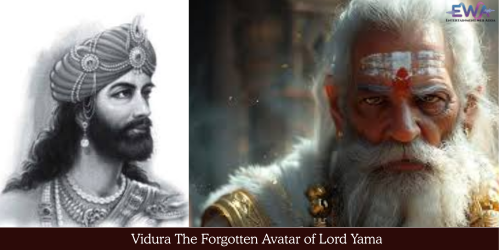Vidura Divine Birth : One of the most sage and upright characters in the epic Mahabharata is Vidura. The fact that Vidura was the earthly manifestation of Lord Yama, the God of Death and Justice, is something that very few people are aware of. Legend has it that because Lord Yama had wrongfully reprimanded the sage Mandavya, the sage cursed him to be born as a mortal. Yama assumed the identity of Vidura, the son of sage and maidservant Vyasa, in order to carry out this curse.
Through several mothers, Sage Vyasa had fathered three sons: Vidura, Pandu, and Dhritarashtra. Because Vidura was born to a maid, he had a lower social standing but a higher level of spiritual wisdom than Dhritarashtra and Pandu, who were born to queens.

The Life of Vidura in Hastinapur
Vidura was raised in Hastinapur, the Kuru royal palace. He was respected for his intelligence, honesty, and profound knowledge of dharma, even though he was born to a maid. He held the positions of minister and top advisor in the Kuru court under King Duryodhana and King Dhritarashtra.
Vidura was always a champion of justice and truth. He was renowned for his forthright speaking and moral rectitude. His sage advice to King Dhritarashtra to put an end to Duryodhana’s wrongdoings and avert the war was frequently disregarded. Vidura never deviated from his moral course even at that time.
120 Bahadur Movie Update here.
Vidura Niti: Life’s Wisdom
The “Vidura Niti” section of the Mahabharata contains a compilation of Vidura’s moral precepts and teachings. It serves as a manual for moral behavior, politics, and ethics. His teachings, which place a strong emphasis on integrity, humility, and the need of self-control, still motivate people today.
The Legacy
Vidura played a vital role in the Mahabharata, although frequently being overshadowed by more outstanding characters. He represented the voice of truth in the midst of corruption and greed, which is the purest form of dharma. His life serves as a reminder that greatness is determined by one’s character and commitment to virtue rather than by birth or position of authority.







Pingback: Salaar 2 Deva vs Vardha, Prabhas & Prithviraj Return
Pingback: Dronacharya The Legendary Guru of Mahabharat & His Past Life